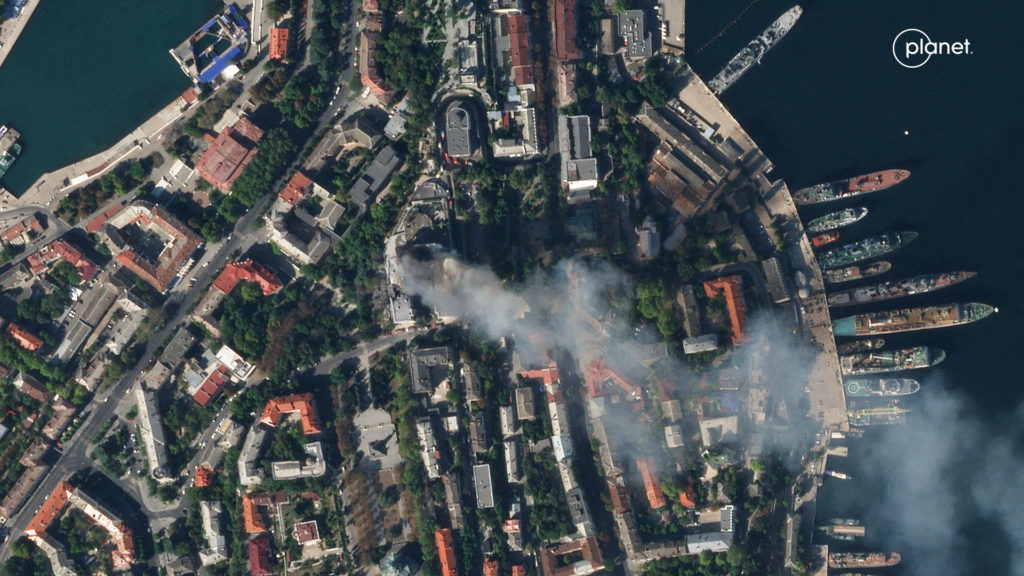
KYIV, Ukraine (AP) — The missile strike that blasted the Crimean headquarters of Russia’s navy last week killed 34 officers, including the fleet commander, Ukraine said Monday, though it provided no evidence to support its claim.
Ukraine’s Special Operation Forces said on the Telegram messaging app that its strike on the main building of the Black Sea Fleet headquarters in the port city of Sevastopol had wounded 105 people. The claims could not independently be verified and are vastly different from what Russia has reported.
Russia’s military announced the attack on the building and initially said one serviceman was killed but later said the person was not killed but missing. Moscow has provided no further updates.
The Crimean Peninsula, which Russia illegally annexed from Ukraine in 2014, has been a frequent target since Russian President Vladimir Putin ordered a full-scale invasion of Ukraine 20 months ago. Crimea has served as the key hub supporting the invasion.
Ukraine has increasingly targeted naval facilities in Crimea in recent weeks while the brunt of its summer counteroffensive makes slow gains in the east and south of Ukraine, the Institute for the Study of War said. It followed Friday’s attack with another barrage on Saturday.
The new death and casualty figures are a steep increase from what Ukraine’s intelligence chief, Kyrylo Budanov, told Voice of America on Saturday when he said at least nine people were killed and 16 others wounded in the attack that left the building smoldering. He also said Alexander Romanchuk, a Russian general commanding forces along the key southeastern front line, was “in a very serious condition.”
The new report indicates that the fleet’s chief, Adm. Viktor Sokolov, was also killed, though no supporting evidence was offered. He was not named in the statement by the Special Operation Forces, but Anton Gerashchenko, adviser to the minister of internal affairs of Ukraine posted his name and a photo on social media.
Ukraine’s military also offered more details about Friday’s attack. It said the air force conducted 12 strikes on the Black Sea Fleet headquarters, targeting areas where personnel, military equipment and weapons were concentrated. It said that two anti-aircraft missile systems and four Russian artillery units were hit.
The casualty figures were announced as Russian drone and missile strikes near Odesa damaged an abandoned hotel, a grain silo and killed two people who were buried in the rubble of a grain warehouse in the Black Sea port city, Ukrainian officials said. Russian attacks elsewhere were blamed for killing six other civilians in the past day in Ukraine.
Ukraine’s air force reported downing all Russian drones launched overnight, but one of 12 Kalibr missiles and two P-800 Oniks cruise missiles apparently made it past air defenses.
Russia has continuously targeted port and grain storage facilities in Odesa since pulling out of a wartime deal that allowed Ukrainian grain exports to countries facing the threat of hunger. The attacks have destroyed silos, warehouses, oil terminals and other infrastructure critical for storage and shipping.
The Russian Defense Ministry said long-range missiles and drones were used to strike facilities that it alleged had housed foreign mercenaries and trained saboteurs. The ministry didn’t name locations or provide other specifics to support its claim. It also said it downed several Ukrainian drones.
The attacks came as independent U.N.-backed human rights experts said they found new evidence of war crimes committed by Russian forces and as President Volodymyr Zelenskyy welcomed the arrival of the first Abrams tanks sent by the U.S. that could figure in their slow-moving summer counteroffensive
The U.N. Independent Commission of Inquiry on Ukraine said it found evidence of crimes committed by both sides in the war, but far more by Russians, including instances of torture, some of it fatal, and rape of women as old as 83. It said it was also looking into allegations that Russian forces committed genocide.
Zelenskyy thanked allies on Telegram for their support in announcing the anticipated arrival of the tanks. He didn’t say how many tanks had arrived, but the U.S. has said it was sending 31 tanks.
In other fighting, Russian forces also dropped bombs and launched six heavy artillery strikes on southern Ukraine’s Kherson region, destroying a school and factory and damaging residential buildings. Three of the deaths reported by the Ukrainian president’s office were in the region: three people were killed and two others were injured by bombs that hit the city of Beryslav. A man was killed in the neighboring village of Lvove.
In eastern Ukraine, Russians attacked residential areas of 10 cities and villages in the Donetsk region, killing two people in the village of Zarichne, according to the presidential office.
During fighting in southeast Ukraine’s Zaporizhzhia region, the Russian army carried out five airstrikes on Orikhiv, a small city, and its surrounding area.
The Russian Defense Ministry said its air defenses downed three Ukrainian drones over the Kursk region of Russia and three others over the Bryansk region early Monday. It also reported that three drones were shot down over the Belgorod region.
Kursk Gov. Roman Starovoit said a downed drone over the center of the city of Kursk damaged the roof of an administrative building and several private houses and shattered windows in an apartment building. Starovoit said there were no injuries.
A day earlier, a Ukrainian drone damaged the roof of an administrative building in Kursk that some Ukrainian and Russian media reported housed the offices of the Federal Security Service, Russia’s main domestic security agency.
Bryansk Gov. Alexander Bogomaz said the drones caused no casualties, but Ukrainian rockets damaged a farm building and killed cattle.
During the drone attack, Russian authorities delayed or diverted several flights at Moscow’s airports.
The Defense Ministry said five other Ukrainian drones were also shot down over Crimea and the Black Sea.
Associated Press journalists Samya Kullab in Kyiv, Yuras Karmanau in Tallinn, Estonia and Brian Melley in London contributed to this report.
ncG1vNJzZmivp6x7sa7SZ6arn1%2Bjsri%2Fx6isq2egpLmqwMicqmiqpajAqq3SZpmlmZOgerSxwGadpZ2VqXqku8ymmKeclad6ornOp55ma2RiuKq4y56bZqGeYq5uucisqqKklWLAtb7IpJxmoZ5isLO1zJ6YZq2bp66qusRmqpqxow%3D%3D